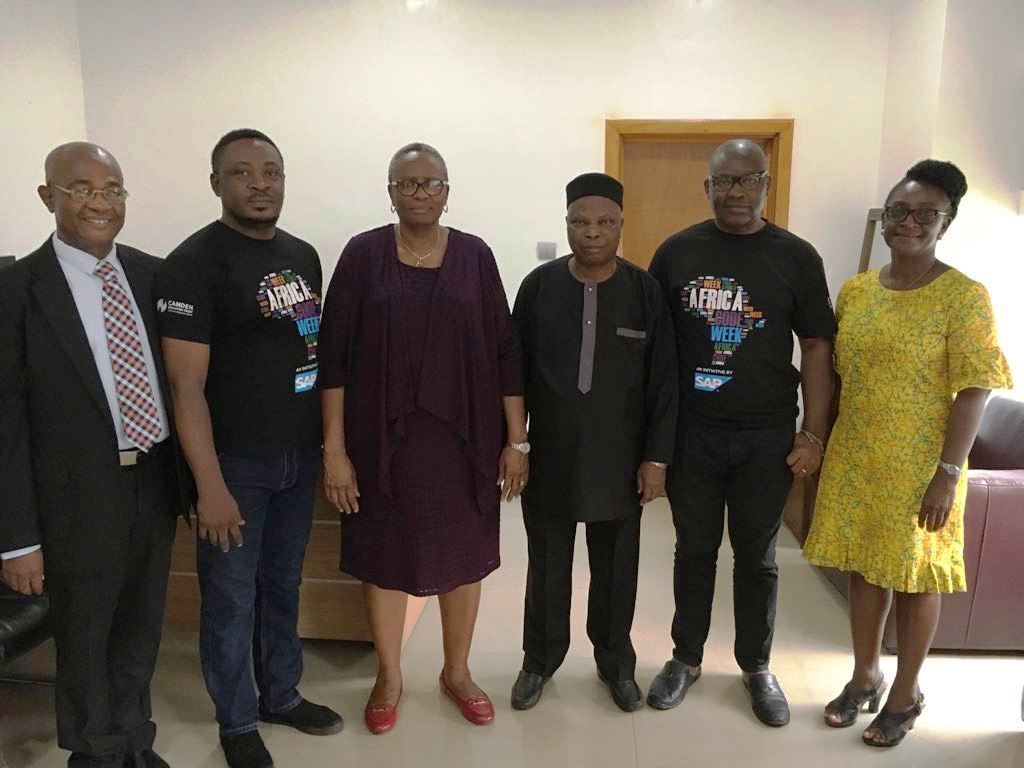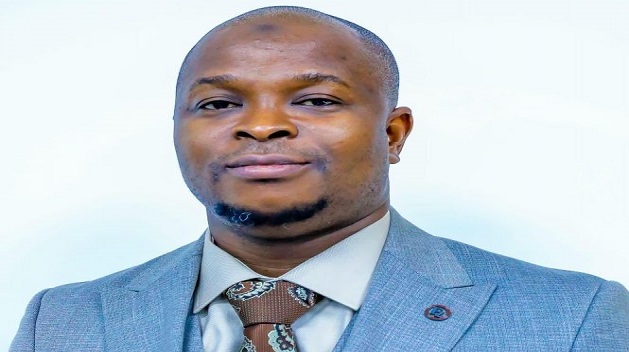Telecom
SAP Initiative ‘Africa Code Week’ Trains Over 500 Teachers in Edo State

Organizers of Africa Code Week (ACW) have said that over one thousand teachers will benefit from information and communications technology (ICT) training in Edo and Enugu States in 2018.
The train the trainer program is part of activities for this year’s 2-week-long ACW in Nigeria and many other African Countries meant to run in every 35 countries from 15 -26 October.
Already, ACW team trained 512 teachers, 26 staff of the ICT Agency of the Edo State government and 32 students from local Universities have been trained in Benin City, next stop is Enugu on 3rd & 4th September where additional 500 teachers are set to be trained.
Launched in 2015 by SAP, in partnership with the Cape Town Science Centre and the Galway Education Centre, Africa Code Week is an initiative that brings together hundreds of schools, teachers, governments, businesses and non-profit organisations with the aim to empower young people across Africa with digital literacy skills.
Working closely with private, public and non-profit partners to drive sustainable learning impact across Africa, the Initiative has benefitted 1.8 million young Africans so far.

Teachers from Edo State receiving training on ICT courtesy SAP initiative called Africa Code Week
Today, it enjoys strong partnerships with the public, private and non-profit sectors are the driving force behind the initiative’s ambitious goals and ability to build community capacity in ICT education across an entire continent.
Africa Code Week is now actively supported by key partners UNESCO YouthMobile, Google, Camden Trust and the German Federal Ministry for Economic Cooperation and Development (BMZ), 15 African governments, over 150 partners and 100 ambassadors across the continent.
With a goal to empower 70,000+ teachers and positively impact the lives of 2 million young Africans by 2020, ACW is built to be sustainable and provide long-term impact.
Commenting on the program, Edo State Governor, His Excellency, Godwin Obaseki affirmed that he’s focused on building capacity in the area of education development.
The Governor expressed his appreciation to SAP, Google, UNESCO and other partners for bringing Africa Code Week to Edo States as this will serve as a catalyst for achieving great success in the State’s digital literacy plan.
To underpin the government’s commitment to Africa Code Week, all senior state executives attended the event to provide support and inspiration to the teachers.
These include but not limited to the following: Rt.Hon.Gabriel E. Oiboh Chairman Post primary Education board (PPEB); Miss Yuwa Naps Executive Director, Training and Exams Services, ICT Agency; Mrs. Gladys Idahor Head of Service; Mr. Taiwo Akerele, Chief of Staff; Dr. Adesotu, Commissioner for Science and Technology and Mr. Emmanuel Agbale, Commissioner for Education.
Mr. Olajide Ademola-Ajayi, Nigeria’s Coordinator, Africa Code Week, Speaking on the preparations for 2018 edition, said that annually, SAP arrange Train-the-Teacher sessions (TTTs) that are organized either by the Africa Code Week team or partnering Ministries and non-profit partners in the run-up to October events.
“With 72 students engaged by every trained teacher on average, ACW TTTs are key multiplier and enabler for digital skills to become core pillar of basic education in each participating country. So, we are excited about Edo and Enugu State Governments’ acceptance to work with us and other partners to digitally impact both the teachers and students.
Mr. Ademola-Ajayi said that participants should expect to gain knowledge in creative computing through hands-on, playful learning, that typifies Africa Code Week- the coding enablement program for Africa’s teeming young generation.

participants display their certificates at Edo State training session
Since 2015, Africa Code Week saw over 1.8 million youth introduced to coding skills across 35 countries in 2015, beating yearly initial targets by a huge margin.
Also, over 5,000 free coding workshops have been organized continent-wide and online since day one, ranging from Scratch all the way to Web programming.
In preparation every edition, SAP has deployed its own IT skilled volunteers to train over 25,000 teachers, parents and local volunteers over the past three years, all over Africa.
With average female participation reaching 46.5%, ACW also makes huge strides towards empowering girls in the digital century and fostering gender equality in African ICT education.
With 390,046 youth introduced to coding during ACW 2017 and the highest engagement ratio of 1,622 youth engaged per 100,000 population.
Telecom
Study Shows Blocks in Telegram are Pushing the Underground Out

Modern messengers, such as WhatsApp, Telegram, Signal and others, are often used for illicit purposes. Kaspersky Digital Footprint Intelligence has conducted an in-depth monitoring of over 800 blocked cybercriminal Telegram channels between 2021 and 2024.

While a range of illegal activities continues to be hosted on the platform, its environment has become noticeably more challenging for sustained underground operations.
Telegram’s bot framework and other built-in features make for a low-effort ecosystem for the underworld.
A single bot can simultaneously manage queries, process cryptocurrency payments, and instantly deliver stolen bank cards, info-stealer logs, phishing kits, or DDoS attacks to hundreds of buyers per day, often without operator involvement.
Unlimited, non-expiring file storage eliminates the need for external hosting when distributing multi-gigabyte database dumps or stolen corporate documents. This frictionless automation naturally favours high-volume, low-price, low-skill offerings, such as leaked bank cards or other data, hosting malware, etc.
High-value, trust-dependent deals (for instance, zero-day vulnerability information) still remain on reputation-gated dark-web forums.
Kaspersky researchers found two clear trends related to illegal activities on Telegram. The average lifespan of shadow channels has increased, with the proportion of channels surviving over nine months more than tripling in 2023-2024 compared to 2021–2022. At the same time, Telegram’s blocking activity has risen significantly.
Monthly takedown figures recorded since October 2024 – even at their lowest – are comparable to the peak levels seen throughout 2023, and the overall pace continued to accelerate in 2025. This impedes malicious activities.
Other disadvantages of Telegram for cybercriminals include the lack of default end-to-end (E2E) encryption for chats, the inability to use their own servers for communication (due to the messenger’s centralised infrastructure), and closed server-side code, which makes it impossible to verify its functionality.
As a result, several established underground communities, including the nearly 9,000-member BFRepo group and the Angel Drainer malware-as-a-service operation, have already begun shifting primary activity to other platforms or proprietary messengers, citing repeated disruptions of their activities on Telegram.
“Fraudsters find Telegram a convenient tool for many malicious activities, but the risk-reward balance is clearly shifting. Channels are managing to stay online longer than a couple of years ago, yet the dramatically higher volume of blocks means operators can no longer count on long-term stability.
“When a storefront or service disappears overnight – and sometimes reappears only to be removed again weeks later – building a reliable business becomes much harder. We’re starting to see the early stages of migration as a direct consequence,” comments Vladislav Belousov, Digital Footprint Analyst at Kaspersky.
Telecom
Galaxy Backbone Marks Two Decades of Powering Nigeria’s Digital Evolution

Galaxy Backbone Limited (GBB), the Federal Government’s leading ICT infrastructure and shared services provider, will mark its 20th anniversary in June 2026 with a grand celebration that reflects two decades of innovation, resilience, and national impact.

Since its inception in 2006, Galaxy Backbone has been at the heart of Nigeria’s digital transformation journey; building the technological foundation that supports modern government operations and public service delivery. What began as a bold vision to connect government has grown into a critical national platform that drives efficiency, transparency, collaboration and innovation across the public sector.
Over the last 20 years, GBB has helped redefine how government works. By providing secure connectivity, enterprise-grade data centre services, cloud platforms, and digital collaboration tools, Galaxy Backbone has enabled Ministries, Departments and Agencies (MDAs) to move from fragmented, paper-based processes to more integrated, technology-driven systems.
This transformation has improved government-to-government coordination, strengthened engagement with businesses, and enhanced the delivery of services to citizens. Today, the digital infrastructure powered by Galaxy Backbone supports thousands of government users, hundreds of institutions, and critical national platforms that Nigerians rely on daily.
A key part of this journey has been the Federal Government of Nigeria’s investment, managed by GBB in robust national infrastructure, high-capacity and world class data centres, fibre-optic connectivity across multiple states, secure hosting services, and shared platforms that have helped government operate more efficiently and responsively. These contributions have played a pivotal role in Nigeria’s progress toward a more digital, agile and citizen-centered public service.
Galaxy Backbone’s impact has earned both national and global recognition. In 2025, the organisation was ranked first overall in the Federal Government Website Performance Scorecard, reflecting its commitment to excellence in digital service delivery. Internationally, GBB, a couple of years ago, received the prestigious United Nations Public Service Award, a testament to its leadership in promoting a whole-of-government approach to digital transformation.
As GBB celebrates two decades of service, this milestone is more than an organisational anniversary; it is a celebration of Nigeria’s digital evolution. It is an opportunity to appreciate how collaboration between government, industry partners, technology providers, and dedicated public servants has helped build a stronger, more connected nation.
The June 2026 anniversary celebration will bring together stakeholders from across the public and private sectors to reflect on the journey so far, acknowledge the partnerships that have shaped this success, and chart an ambitious course for the future. It will highlight how collective effort, shared vision, and innovation have positioned Galaxy Backbone as a strategic national asset.
Looking ahead, Galaxy Backbone remains committed to deepening digital transformation across the country; expanding infrastructure, strengthening cybersecurity, enhancing service delivery, and supporting the Federal Government’s drive for a smarter, more efficient and digitally empowered Nigeria.
At 20 years, Galaxy Backbone stands proud of its past, confident in its present, and inspired by the limitless possibilities ahead.
Telecom
Galaxy Backbone Marks 20 Years, Tops FG Website Scorecard

Galaxy Backbone Limited (GBB), Nigeria’s leading federal ICT infrastructure provider, has announced its 20th-anniversary celebration for June 2026, marking two decades since unifying government’s fragmented digital landscape into a secure national platform.

Galaxy Backbone
The announcement by Head of Media and Corporate Communications Chidi Okpala follows GBB’s top ranking in the 2025 Federal Government Website Performance Scorecard by the Bureau of Public Service Reforms, cementing its leadership in digital service delivery and transparency.
Managing Director Professor Ibrahim Adepoju Adeyanju described the milestone as celebrating Nigeria’s shift from paper-based silos to a cloud-first, integrated government. Achievements include the UN Public Service Award for 1-GOV.net, high-speed fiber deployment for G2G and G2B interactions, IPPIS payroll rollout, and pandemic-era digital support.
The June event will gather public-private stakeholders, global tech partners, and policymakers to unveil GBB’s next-decade roadmap emphasising cybersecurity, AI in public service, and rural connectivity.
GBB positions itself at the forefront of Nigeria’s 2030 digital nation drive, with 20 years of innovation signaling a smarter, connected future.

 E-Financial3 days ago
E-Financial3 days agoAngst as FG Demands 7.5 Percent VAT on Mobile Bank Transfers, USSD

 News3 days ago
News3 days agoMoniepoint Launches Second Cohort of DreamDevs Initiative to Double Down on Africa’s Tech Talent Pipeline

 E-Financial3 days ago
E-Financial3 days agoThe Missing Pieces in Nigeria’s Banking Recapitalisation

 E-Financial3 days ago
E-Financial3 days agoNGX lists 3.156bn UBA shares, boosting capital to N513Bn

 E-Financial2 days ago
E-Financial2 days agoPaystack Expands Beyond Payments into Banking

 Telecom3 days ago
Telecom3 days agoGlo Unveils Immersive Gaming Experience, Travel Saga

 E-Business3 days ago
E-Business3 days agoHalf of Global Companies Build SOCs to Enhance Cybersecurity, with a Focus on Human Expertise

 General News3 days ago
General News3 days agoNITDA DG Reaffirms Nigeria–U.S. Partnership on Data Privacy, AI and Cybersecurity



























